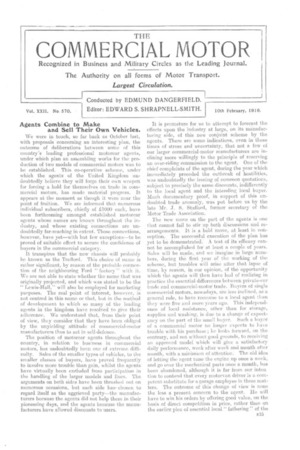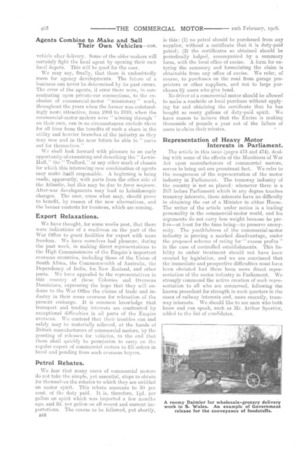COMMERCIAL MOTOR
Page 1

Page 2

If you've noticed an error in this article please click here to report it so we can fix it.
Recognized in Business and Military Circles as the Leading Journal.
The Authority on all forms of Motor Transport. Largest Circulation.
Conducted by EDMUND DANGERFIELD. Editor: EDWARD S. SHRAPNELL-SMITH.
Agents Combine to Make and Sell Their Own Vehicles.
We were in touch, so far back as October last, with proposals concerning an interesting plan, the outcome of deliberations between some of this country's leading professional motorcar agents, under which plan an assembling works for the production of two models of commercial motors was to be established. This co-operative scheme, under which the agents of the United Kingdom undoubtedly believe they will forge their own weapon for forcing a hold for themselves on trade in commercial motors, has made material progress. It appears at the moment as though it were near the point of fruition. We are informed that numerous individual subscribers, chiefly of £1000 each, have been forthcoming amongst established motorcar agents whose names are known throughout the industry, and whose existing connections are undoubtedly far-reaching in extent. Those eonneetions, however, have yet—with but few exceptions—to be proved of suitable effect to secure the confidence of buyers in the commercial category.
It transpires that the new chassis will probably he known as the Trafford. This choice of name is rather significant, by reason of the probable connection of the neighbouring Ford " factory '' with it. We are not able to state whether the name that was originally projected, and which was stated to be the " will also be employed for marketing purposes. The realpoint of interest, however, is not centred in this name or that, but in the method of development to which so many of the leading agents in the kingdom have resolVed to give their adherence. We understand that, from their point of view, they consider that they have been obliged by the unyielding attitude of commercial-motor manufacturers thus to act in self-defence.
The position of motorcar agents throughout the country, in relation to business in commercial motors, has undoubtedly been one of extreme difficulty. Sales of the smaller types of vehicles, to the smaller classes of buyers, have proved frequently to involve more trouble than gain, whilst the agents have virtually been excluded from participation in the handling of the larger models and lines. The arguments on both sides have been thrashed out on numerous occasions, but each side haschosen to regard itself as the aggrieved party—the manufacturers because the agents did not help them in their pioneering days, and the agents because the manufacturers have allowed discounts to users. It is premature for us to attempt to forecast the effects upon the industry at large, on its manufacturing side, of this new conjoint scheme by the agents. There are some indications, even in these times of stress and uncertainty, that not a few of our larger commercial-motor manufacturers are inclining more willingly to the principle of reserving an over-riding commission to the agent. One of the chief complaints of the agent, during the year which immediately preceded the outbreak of 'hostilities, was undoubtedly the issuing of common quotations, subject to precisely the same discounts, indifferently to the local agent and the intending kcal buyer. Much documentary proof, in support of this undoubted trade anomaly, was put before us by the late Mr. J. S. Stafford, former secretary of the Motor Trade Association.
The new move on the part of the agents is one that cannot fail to stir up both discussions and rearrangements. It is .a bold move, at least in conception...The successful execution of the plan has yet to be demonstrated. A test of its efficacy cannot be accomplished forat least a couple of years. Sales will be made,. and we imagine in large numbers, during the first year of the working of the scheme, but troubles will arise after that lapse of time, by reason, in our opinion, of the opportunity which the agents will then have had of realizing in practice the essential differences between private-ear trade and commercial-motor trade. Buyers of single commercial motors, nowadays, are less inclined, as a general rule, to have recourse to a local agent than they were five and more years ago. This independ7 ence of local assistance, other than for storage, supplies and washing, is due to a change of expectancy on the part of the small buyer. Such a buyer of a commercial motor no longer expects to have trouble with his purchase; he looks forward, on the contrary, and not without good grounds, to receiving an approved model which will give a satisfactory daily performance, week after week and month after month, with a minimum of attention: The old idea of letting the agent time the engine_ up once a week, and go over the mechanical parts once a month, has been abandoned, although it is far from our inten tion to contend that every motors-an driver is a competent substitute for a garage employee in these matters. The outcome of this change of view is none the loss a present concern to the agent. He will have to win his orders by offering good value, on the basis of direct competition in price, rather than an the earlier, plea of essential local " fathering of the vehicle after delivery. Some of the older makers will certainly fight the localagent by opening their own local depotS.. This will be good for the user.
We may say, finally, that there is undoubtedly • room for agency developments. The future of a business can never be determined by its past errors. The error of the agents, if error there were, in concentrating upon private-car connections, to the exclusion of commercial-motor " missionary " work,throughout the years when the former was outstandingly more attractive, from 1903, to 1916; when the commercial-motor makers were "-winning through'' on their own, can in no circumstances exclude them . for all time from the benefits of such a share in the utility and heavier branches of the industry as they may now and in the near future he able to " carve out for themselves." .
We shall look forward with, pleasure to an early opportunity of examining and describing the ' LewisHall," the " Trafford," or any other mark of chassis for which this interesting new combination of agents may make itself responsible. A beginning is being made, apparently, with parts from the other side of the Atlantic, but this may be .due. to force ma:mere. : After-war :developments may lead to kaleidoscopic changes. The user, come what may, should prove . to benefit, by reason of the new alternatives, and the keener contests for business, which are coming.
Export Relaxations.
We have thought, for some weeks past, that there were indications of a readiness on. the part of the War Office to grant facilities for export with more freedom. We have ourselves had pleasure, during the past week, in making direct representations to the High Commissioners of the Empire's important overseas countries, including those of the. Union of South Africa, the Commonwealth of Australia, the Dependency of -India, foi; New Zealand, and other parts. We have appealed to the representatives in this country of these Colonies and Overseas Dominions, expressing the hope that they will endorse to the War Office the claims of trade and industry in their areas overseas for relaxation of the present embargo. It is common knowledge that transport and trading interests are confronted by exceptional difficulties in all parts of the Empire overseas. We contend that their troubles can and safely may be materially relieved, at the hands of British manufacturers of commercial motors, by the granting of releases for vehicles, to the end that there shall quickly be permission to carry on the regular export of commercial motors to fill orders in hand and pending from such overseas buyers.
Petrol Rebates.
We fear that many users of commercial motors do not take the simple, yet essential, steps to obtain for themselves the rebates to which they are entitled on motor spirit. This rebate amounts to 50 per cent. of the duty paid. It is, therefore, lid per gallon on. spirit which was imported a• few months ago, and .3d: per gallon on all recent and -Current importations. The course to be followed, put shortly, ni6 is this: (I) no petrol should be purchased from any supplier, without a certificate that it is duty-paid petrol; .(2) the certificates so obtained should be periodically lodged, accompanied by a summary form, with the local office of excise. A form for entering the summary and formulating the claim is obtainable from any office of excise. We refer, of course, to purchases on the road from garage proprietors or other suppliers, and not to large purchases b'y users who give bond.
No driver of a commercial motor should be allowed to make a roadside or local purchase without applying for and obtaining the certificate that he has -bought so many gallons of duty-paid spirit. We have reasonto believe that the Excise is making thousands of pounds a year out of the failure of users to claim their rebates.
Representation of Heavy Motor . . . Interests in Parliament.
The article in this issue (pages 473 and 474), dealing with some of the effects of the Munitions of War Act upon manufacturers of Commercial motors, serves to bring .ont one prominent fact. We refer to the 'Meagreness of the representation of the motor industry in Parliament. The tramway industry of the country is not so placed: whenever there is a Bill before Parliament which in any degree touches tramway interests, those interests have no difficulty in obtaining the ear of a Minister in either House. The writer of the article under notice is a leading personality in the commercial-motor world, and his arguments do not carry less weight because he prefers—at least for the time being—to pre-serve anonymity. The youthfulness of the commercial-motor industry is proving a marked disadvantage, under the proposed scheme of rating for " excess profits " in the case of controlled establishments. This liability to unfair treatmentshould not have been created by legislation, and we are convinced that the immediate and prospective difficulties must have been obviated had there been More direct representation of the -motor. industry in Parliament. We strongly commend the active creation of such 'representation to all who are concerned, following the known precedent for strength in such quarters in the cases of railway interests and, more recently, tramway interests. We should like to see men who both know and can speak, such as Mr. Arthur Spurrier, added to the list of candidates.




















